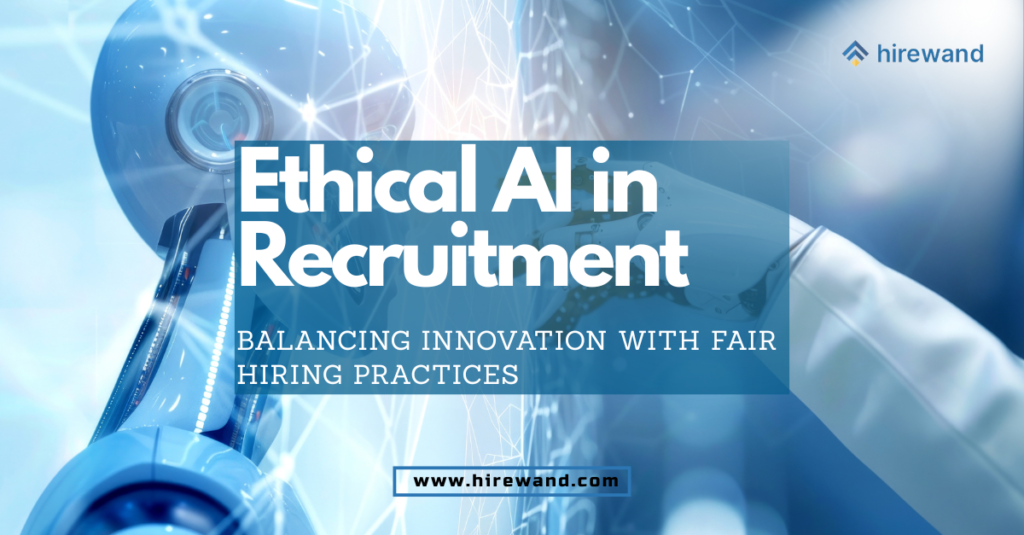
Artificial Intelligence has become one of the most transformative forces in recruitment today. From instantly screening thousands of resumes to intelligently matching candidates with open roles, AI is speeding up processes, improving accuracy, and giving recruiters more time to focus on human connections.
But with great power comes great responsibility.
AI is not immune to bias, misjudgment, or error—it can amplify human prejudice if not designed with the right safeguards. In recruitment, where a single automated decision can determine a candidate’s career trajectory, the stakes are too high to treat AI as just another tool. That’s where Ethical AI comes in.
At Hirewand, we believe AI should enhance fairness, improve transparency, and protect candidate trust. This belief is more than a philosophy—it’s built into every part of our recruitment automation platform.
Why Ethical AI Matters in Hiring
1. AI Can Amplify Human Bias
If an algorithm learns from historical hiring data that unintentionally favored certain backgrounds, genders, or ethnicities, it will repeat those patterns. This is why bias in AI isn’t just a possibility—it’s a proven risk.
Ethical AI actively works against this risk by:
- Using diverse and representative datasets during training.
- Removing demographic identifiers like name, gender, and location from decision-making.
- Regularly auditing outcomes to ensure fairness is maintained over time.
2. Transparency Builds Trust
Recruitment isn’t just about finding the right candidate—it’s also about building a reputation as a fair and trustworthy employer. In today’s hiring climate, candidates want to know how decisions are made.
Ethical AI replaces the “black box” approach with explainable processes:
- Recruiters can see why a candidate was ranked or shortlisted.
- Decision factors are documented and accessible, so there’s no mystery in the process.
- This openness helps companies earn trust and improve candidate experience.
3. Compliance is Non-Negotiable
Hiring involves sensitive personal data, and data protection laws are becoming stricter worldwide. The EU AI Act, GDPR, and other regulations are clear: AI systems must be explainable, accountable, and privacy-first.
Hirewand’s platform is designed to be compliant from day one:
- We follow global data privacy standards.
- Candidate information is encrypted and access-controlled.
- AI models are built and monitored with fairness and compliance in mind.
The Hirewand Approach to Ethical AI
1. Fairness by Design
- We intentionally strip away non-job-related data points before AI makes decisions.
- Our models focus purely on skills, experience, and job match.
2. Explainable Automation
- Every AI decision is traceable. Recruiters can see the “why” behind matches and rankings.
- This transparency helps hiring managers feel confident in acting on AI recommendations.
3. Continuous Bias Monitoring
- We don’t set and forget our AI models.
- We actively track hiring results to spot trends and correct any emerging bias.
The Future: AI as a Partner, Not a Judge
Ethical AI doesn’t mean removing automation—it means using it intelligently. The future of recruitment will see AI as a co-pilot:
- Handling repetitive, high-volume tasks like screening, ranking, and scheduling.
- Providing recruiters with insights to make better human-led decisions.
- Freeing up recruiters to focus on relationship-building and strategic talent planning.
When AI is treated as a partner rather than the final authority, we create a balanced system where speed meets fairness, and efficiency meets empathy.
Why Ethical AI is a Competitive Advantage
- Attract Better Talent – Candidates are more likely to apply when they believe the process is fair.
- Protect Employer Brand – Ethical hiring protects your reputation in a competitive talent market.
- Future-Proof Your Hiring – Being ahead on ethical and regulatory compliance saves costly fixes later.
At Hirewand, we’re proud to be part of this shift toward responsible recruitment automation. We believe that when AI is fair, transparent, and bias-free, it doesn’t just make hiring faster—it makes it better for everyone.
For more details, visit www.hirewand.com

